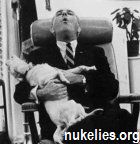The History of Public Inquiries
Thoughts suggested to me by a comment in H G Wells's 'Experiment in Autobiography'; after the First World War, in England, he wrote '..the happy light of survivorship shone in their eyes..' and added ironically that an Inquiry (or Enquiry in those days) would be 'disagreeable' to ordinary people. (Bertrand Russell had the same attitude to the populace - 'they had learned nothing.') However, there had been a 'report' during the First World War - the Bryce Report, a collection of propaganda atrocity stories aginst the Germans.
At any rate, there was no public investigation into the cause(s) of that war. Nor of course into the Second World War, though historians of the usual mediocre type amused themselves over these issues. This is my review, after some investigative work, of A J P Taylor's 'The Origins of the Second World War' - https://www.amazon.co.uk/gp/cdp/member-reviews/A1IZWTVAQVJIFE?ie=UTF8&display=public&sort_by=MostRecentReview&page=4
There has been in Britain an investigation into the Iraq Wars, the Chilcot Inquiry, which of course was a whitewash. There have also been inquests into deaths - a form of public inquiry - Dr Kelly and Diana in Britain being examples, in both cases so obviously flawed that they are spoken of only with embarrassment. In the USA there's the much earlier analogous case of the Warren Commission's multi-volume joke report on J F Kennedy's murder. By the time of the 9/11 joke report, the multi-volume-as-impressive-artefact feeling seems to have worn off - a tatty paperback of evasion was considered sufficient.
I don't suppose most readers of this site will be so unsophisticated as to imagine Nuremberg was in any way honest, or had any intention of being honest.
The point here is that inquiries are avoided, roughly speaking, at all costs. I suspect one of the motives some Jews had in funding Hitler, was that he was happy to expel Jews, but did not seem to want any sort of inquiry into what they had actually done. They wanted Jews forced to go to the Middle East, Hitler wanted them out, so an implicit deal was done.
From the Establishment fraud viewpoint, the best inquiries are those that never happen. Was Roosevelt murdered? Was Forrestal murdered? - If so, there's no official investigation.
I'm not optimistic that the truth about nuclear power, or nuclear weapons, will ever emerge. And there's a related issue, of compensation. There must have been people who felt depressed, suicidal, or generally like giving up, when nuclear weapons were announced. Some must have sold up for a pittance, or otherwise behaved in ways appropriate to the end of the world. Should the proponents of the fraud be forced to compensate them? I don't see why not.
Public Inquiries
3 posts
• Page 1 of 1
Re: Public Inquiries
What do you think of the theory that jews were put into camps to protect them from the Allied bombing? Just taking a guess, without looking at any data, it seems to me that the jews in the camps had a higher rate of survival than the Germans in say, Dresden or Berlin during the firebombings.
-

FirstClassSkeptic - Posts: 671
- Joined: 20 Mar 2011 21:19
Re: Public Inquiries
It's true the camps were the safest places to be during the war, because the Germans took their responsibilities seriously and the inhabitants were fed well, protected from disease, allowed Red Cross inspections, and so on. This only ceased near the end of the War, under the stresses of allied bombing and denial of services. I don't think it was deliberately to help Jews, though; I don't know if the camps would have been bombed if they'd held Arabs or Germans, in the way the Americans bombed Vietnamese hospitals.
-

rerevisionist - Site Admin
- Posts: 1056
- Joined: 18 Mar 2011 11:40
3 posts
• Page 1 of 1
Return to Other Revisionisms, Hyper-Revisionisms & Off-Topic Debates
Who is online
Users browsing this forum: No registered users and 1 guest